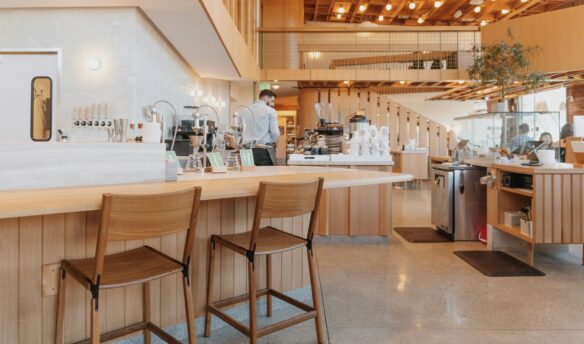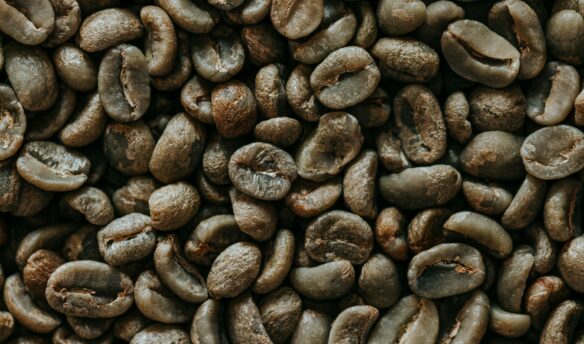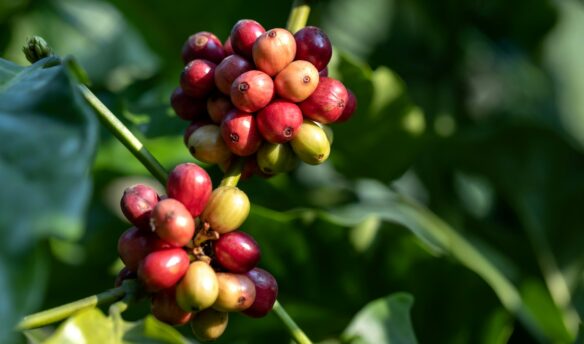Kenya’s coffee sector is in chaos, Lavazza isn’t happy with the EU’s deforestation law, and how to find a €1 espresso in Paris. Plus, does coffee make you happy?
‘Chaos as Coffee Auction Shut for Fourth Week in Row’ – via the Nation
The Nairobi Coffee Exchange (NCE) in Kenya has been closed for over a month after government attempts to reform the country’s coffee sector led to it suspending all marketing and brokerage licenses.
Over 90% of Kenyan coffee trades through the NCE, an auction house and spot market founded in 1934 during British colonial rule. Its closure means hundreds of thousands of unsold bags of coffee are lying in warehouses. Farmers face steep losses because they cannot deliver contracted coffee to international buyers and are forced to hire security to protect their coffee from thieves.
The country’s government, led by Deputy President Rigathi Gachuagua, has been attempting to rid the industry of alleged “coffee cartels,” large companies which use multiple subsidiaries to manipulate prices. In a statement, Agriculture and Livestock Development Cabinet Secretary Mithika Linturi said: “The ministry has taken note of many players participating in the coffee trade along the coffee value chain, the different roles that they play from farm to cup, and the challenges that coffee farmers face as a result of probable existing conflicts of interests amongst the various categories of value chain players.”
While the exchange remains closed and licenses suspended, producers remain in limbo with coffee they cannot sell. “Coffee is now stockpiling. If more coffee ends up in the market, the prices will drop sharply, and we are all going to lose,” one farmer said.
Although Kenyan coffee is highly regarded within the specialty market, production has fallen recently, and farmers have switched to better-paying crops such as avocado or left agriculture altogether. Farmers and other industry players have asked the government to enact reforms to help the sector recover. Suggestions include a minimum guaranteed price, more funding for the country’s Coffee Research Institute, and more transparency around transactions at the exchange.
‘Lavazza Pushes Back On EU Deforestation Law It Voluntarily Agreed To’ – via Sprudge
As the coffee industry prepares for the implementation of the European Union’s new anti-deforestation law, won’t you spare a thought for the real victims: multinational corporations?
The law obliges importers and buying companies to prove that their commodity purchases did not contribute to deforestation and can levy hefty fines against violators. Italian coffee giant Lavazza is the latest company to make its concerns known about the “practicalities” of the law, which will come into force in late 2024.
However, Reuters notes: “The pushback comes despite voluntary, public commitments by the companies themselves and the broader coffee and cocoa industry to clean up supply chains using audits carried out by third parties like Fairtrade.”
Lavazza Group chairman Giuseppe Lavazza blamed the opaque coffee supply chain and the number of intermediaries for his company’s misgivings. “It will be very difficult to implement this law in practical terms,” Lavazza said, “because the coffee supply chain is very complex and traceability is very difficult.”
Reuters points out that the EU only introduced this new legislation “because years of voluntary commitments by food companies to rid their supply chains of environmental harms had largely failed to have an impact on the ground.”
The Daily Coffee News piece we highlighted last week pointed to large companies already invested in traceability as the ones best placed to follow the new laws. A greater challenge, the authors write, is supporting the millions of smallholder farmers who might not have the resources to comply.
‘Paris Helps Cafés Offering €1 Espressos by Putting Them on the Map’ – via France 24
It can be hard to find affordable coffee these days, especially in an expensive city like Paris. But the Paris city council is here to help, hosting a crowdsourced map of cafés that still serve espresso for just €1.
The map is ten years old and lists around 80 cafés in central Paris, with suggestions sourced from social media recommendations. Most spots lie away from touristy areas where some of the city’s most famous cafés charge between €3.40 to €4.90 for an espresso.
Paris has long been an expensive city, but the trend is worsening: in 2017, it was ranked seventh most expensive city in the world by the Economist; in 2019, it shared the top spot with Singapore and Hong Kong (although it has since fallen slightly). These fluctuations are reflected in the coffee map: when it was first launched a decade ago, there were about double the number of cut-price coffee options, but that number has fallen as the years have passed.
One café manager interviewed for the piece said even though inflationary pressures mean that menu prices are constantly under review, the €1 espresso is here to stay: “With my associates, we often talk about changing the prices, but never on coffee. It is part of the identity of the place.”
More News
‘The Hario Pegasus Manual Brewer Takes Flight‘ – via Daily Coffee News
‘Costa Coffee Threatened With Boycott Over a Single Cartoon Drawing of a Trans Man‘ – via Pink News
‘Luckin Coffee Surges With Record-breaking Sales and Outlet Growth’ – via World Coffee Portal
‘SCA to Host Doughnut Economics Discussion Forum’ – via Global Coffee Report
‘The Original San Francisco Philz Coffee Shop is Closing’ – via Daily Coffee News
‘Millennials & Gen Z’s Thirst for Cold Drinks is Boosting Starbucks’ Bottom Line‘ – via Yahoo! Finance
‘SCA Award Hails Probat Hydrogen Roaster‘ – via STiR Coffee and Tea
‘German Coffee Association Completes Espresso Extraction Research‘ – via Daily Coffee News
Is Coffee Good For You?
By now, we know that coffee is, generally speaking, good for us. But can it make you happy? That’s what an article in Well + Good set out to discover with the help of a registered dietician.
The crux of the piece revolves around people living in so-called Blue Zones—five regions worldwide home to unusually long-lived individuals—who reportedly drink coffee daily. To add to this, the author also points to Finland, which is listed as the world’s happiest country and whose inhabitants have one of the highest per-capita coffee consumption rates.
Many people point to the act of brewing and enjoying coffee as meditative, and we’ve previously reported on a study that found that the ritual of drinking coffee is what gives us an alertness boost. However, there is no actual scientific link between coffee and happiness, mostly because happiness is pretty hard to measure.
Studies have found a possible correlation between coffee consumption and a lower risk of depression and improved brain function. However, one long-term study also found the association between coffee drinking and psychological well-being to be “largely null or weak.”
Speaking of correlation, the Blue Zone inhabitants’ coffee habits might be helping their longevity, but so might their diets, exercise regimes, social ties, and less stressful lives. Finland, meanwhile, has a good public school system, low levels of inequality, and robust social housing and healthcare systems.
Coffee can’t really compete with that.
















